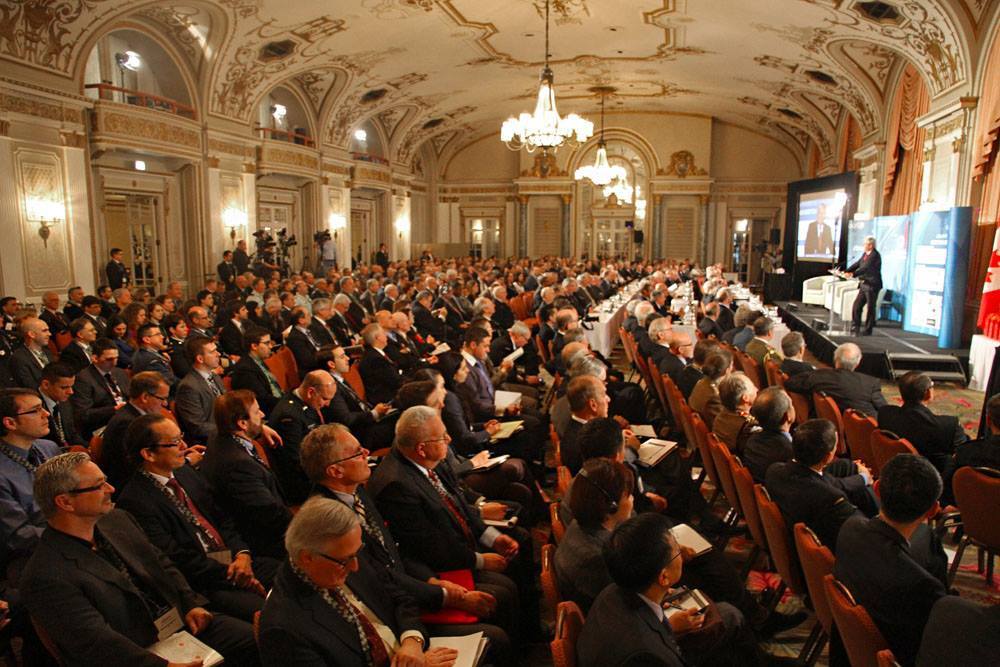Conference of Defence Associations
“Ottawa Conference on Security & Defence” by Conference of Defence Associations
Established in 1932, the Conference of Defence Associations (CDA) describes itself as a “non-partisan, independent, non-profit organization [that] expresses its ideas and opinions with a view to influencing government security and defence policy."
Since its inception CDA has been indirectly or directly financed by the Department of National Defence (DND). CDA also receives funding from corporate sources, primarily arms manufacturers and military service providers. CDA’s 2015 conference in Ottawa received “generous support of … General Dynamics, NATO and the Department of National Defence … ADGA Group, Boeing Canada, Ernst and Young, Porter, Rheinmetall, United Technologies, AUG Signals.” Previous annual conventions received the backing of Lockheed Martin Canada, ATCO Structures & Logistics and Irving Shipbuilding.
CDA represents over 50 military associations ranging from the Naval Association of Canada to the Canadian Infantry Association, Royal Canadian Legion to the Military Intelligence Association. The CDA is run by high-ranking former officers, including individuals with close ties to arms manufacturers. CDA Institute president between 2004 and 2008, Paul Manson, was former chairman of Lockheed Martin Canada and Chief of the Defence Staff. In Joining Empire: The Political Economy of the New Canadian Foreign Policy Jerome Klassen summarizes CDA’s makeup and work: “With a Board of Directors that condenses the state-corporate–military nexus in Canada, it organizes conferences around security and defence issues, lobbies for military spending increases, publishes papers on defense strategy, and funds sympathetic research on University campuses.”
CDA publishes Security and Defence Briefings, Vimy Papers and Presentations and Position Papers. The organization’s quarterly journal ON TRACK “promotes informed public debate on security and defence issues and the vital role played by the Canadian Armed forces in society.” CDA has also published influential books such as Queens professor Douglas Bland’s A Nation at Risk: the decline of the Canadian Forces.
Since its creation, defence ministers and governor generals (as commander in chief) have regularly appeared at CDA’s annual conference. The governor general, prime minister, defence minister and chief of the defence staff are honorary patrons or vice patrons of the organization.
CDA advocates militarism. Its first official resolution noted “the urgent need for an increased appropriation for national defence.” At almost every CDA convention between 1946 and 1959 a resolution passed in favour of compulsory military training. A 1968 resolution called for universal military training, expressing concern that a generation of Canadians had become “unused to the idea of military service.”
In the 1980s CDA developed the idea of the “Total Defence of Canada”. In 1985 Colonel H. A. J. Hutchinson told a CDA meeting: “I would say that the Total Defence of Canada requires much more than just the support of the Canadian Armed Forces, it involves the organization of our total economy, our industrial base, towards a single objective — the defence of this country.” Hinting at the need to talk up US President Ronald Reagan’s revival of Cold War rhetoric, Hutchison said this “can only be made [possible] if the Canadian people perceive that it is necessary and that, in fact, it is the only course of action open to them.”
A 2000 CDA report funded by the Business Council on National Issues, the Molson Foundation and DND advocated increased military spending to defend free trade. It claimed “the defence establishment, including the Canadian Forces, plays a key role in an international policy which provides the insurance and the means which allow the national interest to flourish. It contributes to stability at home and abroad, thus supporting the development of an environment congenial to trade.”
During Canada’s war in Afghanistan the president of the CDA Institute lambasted the media, claiming it undercut the mission. John Scott Cowan told a crowd that included future military leaders and Defence Minister Peter MacKay: “[The] media give new depth to the word ‘shallow’ … Unlike 40 years ago when journalists were amongst the best-educated and best-informed citizens, today many of them are neither literate nor numerate, and do us the huge discourtesy of assuming we aren’t either.” Cowan further complained about “the narcissism of portions of the media who report incessantly on themselves” and bemoaned journalists who ask average Canadians their opinion on political subjects. “[Reporters] stick microphones under the noses of whatever slack-jawed gum-chewing vagrants they can find on the street to ask them what they think about oil prices or border security or equalization payments.”
At the height of Canada’s war in Afghanistan CDA received a highly politicized five-year $500,000 contract from DND. University of Ottawa professor Amir Attaran wrote, “that money comes not with strings, but with an entire leash.” To receive the money CDA committed to producing 15 opinion pieces or letters to the editor in major Canadian newspapers, generating 29 media references to the organization and eliciting 100 requests for radio/television interviews. The media work was part of a requirement to “support activities that give evidence of contributing to Canada’s national policies.” CDA didn’t initially disclose its 2007–12 DND sponsorship agreement, which was reviewed by cabinet.

